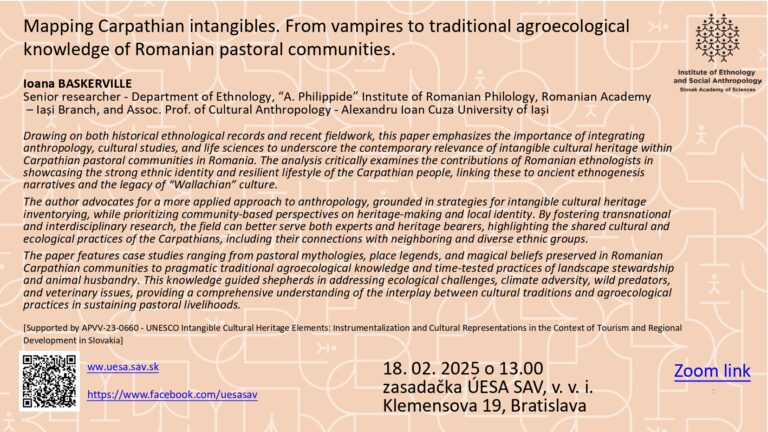Mapping Carpathian intangibles. From vampires to traditional agroecological knowledge of Romanian pastoral communities
- 18.2.2025
- о 13:00

On behalf of the Scientific Council of the Institute of Ethnology and Social Anthropology of the Slovak Academy of Sciences, we invite you to a academic seminar featuring Ioana Baskerville from the Department of Ethnology, “A. Philippide” Institute of Romanian Philology, Romanian Academy – Iași Branch, and Alexandru Ioan Cuza University of Iași. She will present a lecture in English titled:
“Mapping Carpathian Intangibles: From Vampires to Traditional Agroecological Knowledge of Romanian Pastoral Communities.”
The seminar will take place on Tuesday, February 18, 2025, at 1:00 PM in the meeting room of the Institute of Ethnology and Social Anthropology, Slovak Academy of Sciences, at Klemensova 19, Bratislava. You can also attend the event online via Zoom: https://us06web.zoom.us/j/87568249755?pwd=wFGtTPSWcJrAZAjThNSDibHSHsDch1.1
Lecture Abstract
Drawing on both historical ethnological records and recent fieldwork, this paper emphasizes the importance of integrating anthropology, cultural studies, and life sciences to underscore the contemporary relevance of intangible cultural heritage within Carpathian pastoral communities in Romania. The analysis critically examines the contributions of Romanian ethnologists in showcasing the strong ethnic identity and resilient lifestyle of the Carpathian people, linking these to ancient ethnogenesis narratives and the legacy of “Wallachian” culture.
The author advocates for a more applied approach to anthropology, grounded in strategies for intangible cultural heritage inventorying, while prioritizing community-based perspectives on heritage-making and local identity. By fostering transnational and interdisciplinary research, the field can better serve both experts and heritage bearers, highlighting the shared cultural and ecological practices of the Carpathians, including their connections with neighboring and diverse ethnic groups.
The paper features case studies ranging from pastoral mythologies, place legends, and magical beliefs preserved in Romanian Carpathian communities to pragmatic traditional agroecological knowledge and time-tested practices of landscape stewardship and animal husbandry. This knowledge guided shepherds in addressing ecological challenges, climate adversity, wild predators, and veterinary issues, providing a comprehensive understanding of the interplay between cultural traditions and agroecological practices in sustaining pastoral livelihoods.
The scholarly seminar is organized as part of the APVV-23-0660 project, Elements of UNESCO Intangible Cultural Heritage: Instrumentalization and Cultural Representations in the Context of Tourism and Regional Development in Slovakia. This project is led by the Department of Cultural Management and Tourism, Cultural Studies, and Ethnology at the Faculty of Arts, Constantine the Philosopher University in Nitra, with the Institute of Ethnology and Social Anthropology, Slovak Academy of Sciences as a co-research institution.